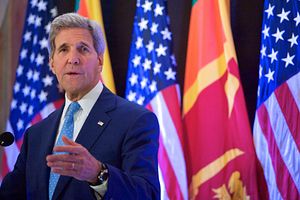U.S. Secretary of State John Kerry recently visited Sri Lanka. He was accompanied by Nisha Biswal, Assistant Secretary of State for South and Central Asian Affairs.
Kerry and company were welcomed with open arms by the Sirisena administration and this high-level visit is the latest (and most prominent) reminder that Sri Lanka’s recent political shakeup is a genuine game changer for the Obama administration.
It was a brief stay and one could argue that Kerry may have been too hard-pressed for time to travel to the Tamil-dominated north. However, the optics of this trip may disappoint many ethnic Tamils and Muslims. (He did find time to visit a Buddhist temple just outside of Colombo.)
Among other matters, many may be left wondering about the Obama administration’s past proclamations regarding justice and ‘accountability’ for alleged wartime abuses during the end of the country’s civil war. Kerry expressed hope that Sri Lanka’s domestic accountability mechanism would adhere to international standards.
In an optimistic speech at the Taj Samudra Hotel Kerry gave a wide-ranging talk that covered everything from devolution to regional economic integration to climate change to a brief reference to democratic backsliding in the Maldives. Kerry also noted the commencement of an annual “partnership dialogue” between Washington and Colombo.
Towards the beginning he said that “the problems of Sri Lanka are clearly going to be solved by Sri Lankans. That’s the way it ought to be, but it’s also the only way it’s going to work. And you wouldn’t have it any other way.”
He outlined the possibility of U.S.-Sri Lanka cooperation in four areas: reconciliation; justice and accountability; human rights; and the strengthening of democratic institutions.
Throughout the speech Kerry consistently struck notes of hopefulness and a desire for collaboration. Washington is more than willing to offer assistance, but that’s a decision for Colombo to make. Clearly, Kerry came to the island nation bearing reassurance that the acrimony that had plagued U.S. – Sri Lanka ties in recent years was a thing of the past.
The Sirisena administration has given assurances that the creation of a domestic accountability mechanism is ongoing and has indicated that they would be willing to receive technical assistance from the United States. Let’s wait and see how quickly any of that happens.
Parliament’s recent passage of the 19th amendment to the constitution (which trims presidential powers) has been meet with high praise in Washington and, with a Rajapaksa comeback looking increasingly unlikely, the U.S.-Sri Lanka “reset” is obviously moving quickly.
Admittedly, the Sirisena administration has made some early steps in the right direction and there are other instances where progress remains very limited; while acknowledging that there’s plenty of work left to be done, Kerry emphasized that he’s very encouraged. During his speech, he noted that “Sri Lanka’s story carries the promise that people can hold their government accountable, use peaceful dissent, use the power of the ballot box and change the course of history. And we can already see here the power of that promise.”
Sri Lanka’s political situation is still fragile and the lasting effects of Maithripala Sirisena’s rise to the presidency remain unknown, although, for now, one thing looks clear: he has many new friends in Washington.
Taylor Dibbert is a freelance writer based in Washington, D.C. and the author of Fiesta of Sunset: The Peace Corps, Guatemala and a Search for Truth. Follow him on Twitter @taylordibbert.

































